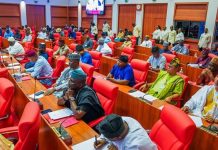In 2004, some displaced white farmers from Zimbabwe arrived in agrarian communities in the Shonga district of Edu Local Government Area of Kwara State on the invitation of the state government. The governor of the state at the time, Bukola Saraki, said they were invited to revolutionise agricultural practice and enhance the government’s agro-economy initiative.
About 20 years after, PREMIUM TIMES’ Yakubu Mohammed visited some of these communities, where he found local farmers enduring the brunt of government-backed deforestation and land degradation as they contended with the worsening food crisis ravaging the country.
Abdullahi Jubril, a local farmer in Dumagi, one of the villages affected by the takeover of land by the Kwara State Government in 2004, now struggles to cater for his family from a small portion of farmland he said has been overused and barely gives him enough yields.
Before 2004, Mr Jubril practised a mixed-crop farming system, planting guinea corn, millet, melons, yam, groundnut, and other grains. However, he said, the arrival of white Zimbabwean farmers facilitated by the Kwara State Government under the Shonga agricultural project threatened local farmers like him.
Findings by PREMIUM TIMES showed that the state government acquired 13,000 hectares of land covering vast farmlands with economic trees. Subsequently, the government apportioned 4,755 hectares of the land to local farmers in a buffer zone set some 500 metres away from each of the affected villages.
This, however, rendered many local farmers helpless, including their wives, who relied on the economic trees to make daily earnings. The farmers say the new farmland apportioned to them “was no longer fertile.”
In separate interviews, this reporter spoke to 13 local farmers in Shonga, Ndakansa, Dumagi, Sanchitagi and Faigi villages, all in the northern part of Kwara State. They shared similar stories of declining annual yields as some sought alternative livelihoods.
They explained that their farmlands are no longer fertile for crops like yam, guinea corn and melon.
This trend, they believe, is worsening the food crisis in the state.
Credit: premiumtimesng.com









